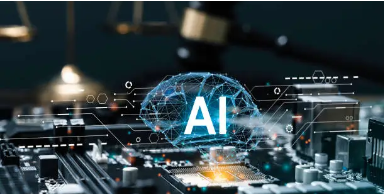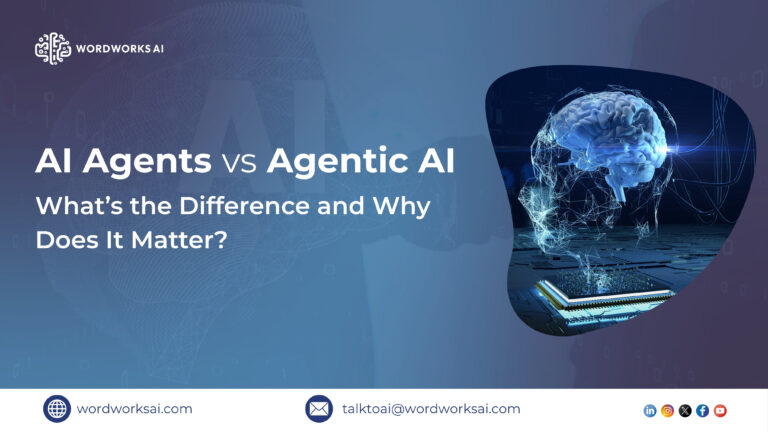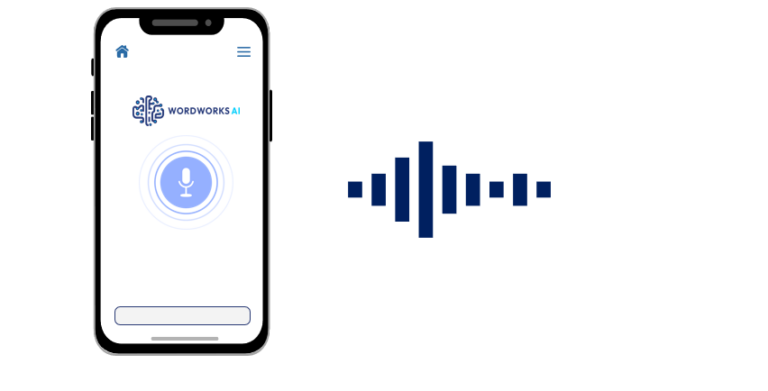Unlocking Value from Generative AI: Responsible Transformation for Modern Enterprises
Summary
This whitepaper explores how Word Works AI drives digital transformation through generative AI technologies that are both scalable and secure. Our approach emphasizes the delivery of AI-powered chatbots and voicebots, enhancing customer engagement and operational efficiency. The whitepaper outlines the importance of responsible AI deployment, focusing on ethical AI governance, data security, and privacy compliance. It also highlights strategies for scaling AI solutions responsibly while managing human impact and fostering collaborative governance. Additionally, we discuss the integration of advanced natural language processing (NLP) and machine learning to continuously improve our AI models, ensuring they are reliable and adaptable for diverse industries.
This whitepaper draws insights from the AI Governance Alliance Briefing Paper Series, focusing on Guidance for Responsible Transformation. It emphasizes responsible transformation with generative AI and explores strategies to align AI implementation with ethical and sustainable practices.
Introduction
Generative AI is transforming industries by unlocking new opportunities for innovation, productivity, and customer experience optimization. This whitepaper explores how organizations can assess generative AI use cases through business impact, operational readiness, and investment strategy. A responsible transformation, supported by a multistakeholder approach, is crucial for navigating challenges related to trust, accountability, scalability, and workforce integration.
At Word Works AI, we leverage advanced AI technologies like Natural Language Processing (NLP), machine learning, and speech recognition to power our AI-powered chatbots and voicebots. These solutions are designed to enhance customer engagement and operational efficiency, all while adhering to responsible AI deployment principles, ensuring ethical, secure, and sustainable outcomes.
Opportunities and Challenges of Generative AI
Generative AI offers transformative opportunities across various sectors. Its ability to mimic human-like creativity and reasoning enables organizations to:
- Innovate Products and Services: Businesses can develop novel products tailored to customer needs, leveraging AI’s capacity to analyze large datasets and uncover insights.
- Streamline Operations: Automation of routine tasks through AI leads to improved operational efficiency and resource allocation, allowing human resources to focus on strategic initiatives.
- Enhance Customer Experience: Generative AI provides personalized interactions, ensuring that customer queries are handled quickly and accurately.
The potential for generative AI to drive sustainable economic growth is substantial, creating new markets and enhancing operational efficiency. However, the adoption of generative AI requires careful assessment and strategic planning.
Assessing Use Cases for Adoption
To effectively implement generative AI, organizations should adopt a structured, use-case-based approach that includes three critical evaluation gates:
Evaluation Gate: Business Impact
Organizations must assess how generative AI aligns with their strategic goals, including revenue implications, cost savings, and overall resource impact. This requires a clear understanding of which use cases deliver significant business value and align with the organization’s mission. For example, AI chatbots can drastically reduce response times and operational costs, leading to measurable returns on investment.

Evaluation Gate: Operational Readiness
Successful deployment of generative AI necessitates a thorough evaluation of an organization’s operational capabilities. This involves assessing:
- Technical Talent: The availability of skilled personnel to manage and implement AI solutions.
- Infrastructure: The necessary technological environment to support AI systems.
- Governance Structures: Establishing frameworks to manage risks effectively and ensure compliance with regulations.

Evaluation Gate: Investment Strategy
Organizations need to balance the upfront costs of developing generative AI solutions with their long-term value potential. This involves:
- Reusability: Evaluating the adaptability of AI models across different use cases.
- Projected Time to Value: Estimating how quickly organizations can expect to see a return on their investment.
- Regulatory Navigation: Understanding the complexities of compliance and how they affect cost and implementation.
Responsible Transformation
As organizations adopt generative AI, responsible transformation becomes crucial to ensure ethical and effective implementation. Key components include:
The Case for Responsible Transformation
Organizations must approach AI adoption thoughtfully, focusing not only on the immediate benefits of AI technologies but also on their long-term implications for society and the economy.
What are the new challenges and downstream impacts?
Addressing Accountability: Defined Governance for Immediate and Downstream Outcomes
To ensure responsible AI deployment, organizations must establish clear governance frameworks. This involves:
- Accountability Structures: Assigning ownership and responsibility for AI systems, ensuring that decisions are made transparently and inclusively.
- Performance Metrics: Defining key performance indicators (KPIs) to monitor AI effectiveness and ethical compliance, enabling organizations to address issues proactively.
By implementing defined governance structures, it helps businesses manage the ethical implications of AI technologies effectively.
Addressing Trust: Enabling Transparency through Communication
Building trust with stakeholders is essential for successful AI adoption. Organizations should:
- Develop Cohesive Narratives: Communicate the purpose and benefits of AI initiatives clearly, fostering transparency and understanding among employees and customers.
- Engage Stakeholders: Involve various stakeholders in the decision-making process to cultivate a sense of shared responsibility and ownership.
There is a need to emphasize effective communication strategies that enhance stakeholder trust and facilitate responsible AI deployment.
What are the best practices for scaling responsibly and bringing about exponential transformation?
Addressing Challenges to Scale: Diverse and Agile Operational Structures
Scaling AI solutions requires organizations to adopt diverse and agile operational structures. This can include:
- Cross-Functional Teams: Encouraging collaboration between technical and non-technical departments to leverage diverse skill sets in AI implementation.
- Flexible Frameworks: Creating adaptable processes that allow for quick responses to changing market demands and technological advancements.
By fostering agile operational structures, we ensures that businesses can scale their AI solutions effectively without sacrificing quality or performance.
Addressing Human Impact: Value-Based Change Management
Organizations must prioritize value-based change management to ensure that their workforce remains engaged and upskilled as AI technologies are integrated. This includes:
- Training Programs: Providing resources and training to help employees adapt to new roles and responsibilities resulting from AI adoption.
- Societal Considerations: Addressing potential job displacement by creating reskilling opportunities and ensuring that the benefits of AI are distributed equitably across society.
Word Works AI is committed to fostering a culture of innovation while maintaining a focus on ethical practices and human impact, ensuring that employees are equipped to thrive in an AI-driven environment.
How Our Solutions Align with Responsible Transformation
Word Works AI integrates the principles of responsible transformation into our AI solutions. Here’s how our offerings align with the key components outlined above:
- Ethical Governance: Our AI solutions are built with transparent, auditable models that can be monitored for compliance with regulations such as GDPR. This ensures ethical AI use while fostering trust among stakeholders.
- Proactive Risk Management: We implement risk mitigation strategies, such as model drift monitoring and reinforcement learning from human feedback (RLHF), to continuously improve our AI models and prevent issues like bias and data misuse.
- Stakeholder Engagement: We prioritize communication strategies that involve all stakeholders in the AI adoption process, ensuring that everyone understands the purpose and benefits of our technologies.
- Agile Operational Structures: Our organizational framework encourages collaboration across teams, allowing for quick adaptations to changes in market demands and enhancing the scalability of our solutions.
- Human-Centric Approach: We focus on providing upskilling opportunities for employees, ensuring that our AI solutions augment human capabilities rather than replace them.
How Word Works AI is Driving AI-Powered Transformation
Word Works AI is leading the charge in digital transformation, delivering AI-powered solutions that significantly enhance customer engagement and operational efficiency. Our chatbots and voicebots are built using advanced architectures that allow them to understand, process, and respond to natural language inputs in real time, providing businesses with highly personalized, effective interactions.
Here’s how we build and deploy these cutting-edge systems:
1. Natural Language Processing (NLP)
Our solutions are designed to handle complex, real-time conversations by leveraging advanced NLP techniques. This enables our AI systems to effectively understand user intent and provide contextually relevant responses, ensuring smoother, more meaningful customer interactions.
- Intent Recognition: By identifying the purpose behind each customer query, our chatbots and voicebots can deliver precise and helpful responses, improving customer satisfaction and reducing resolution times.
- Entity Recognition: Our solutions can efficiently extract critical data points such as names, dates, and locations from user inputs, enabling faster information retrieval and streamlined processes.
2. Machine Learning for Personalization
At Word Works AI, we integrate sophisticated machine learning (ML) algorithms that continuously learn from user interactions. This ongoing improvement ensures that our AI solutions not only meet but exceed customer expectations over time.
- Reinforcement Learning (RL): We use feedback loops to fine-tune our AI models, making them more responsive to evolving user needs and preferences, leading to a highly personalized user experience.
- Customer Segmentation Models: Our AI systems segment customers based on their behavior, preferences, and interaction history, allowing businesses to deliver more targeted and tailored responses that drive customer loyalty.
3. Speech Recognition and Text-to-Speech (TTS) Systems
For businesses looking to enhance customer engagement through voice interactions, Word Works AI offers state-of-the-art voice technologies that enable seamless, human-like conversations.
- Speech Recognition: Our AI solutions convert spoken language into text with high accuracy, ensuring that customer queries are correctly understood and processed.
- Text-to-Speech (TTS): With natural-sounding speech responses, our voicebots create engaging, interactive experiences that help businesses improve customer satisfaction while maintaining efficiency.
Scalable, Secure, and Flexible AI Solutions
Our AI solutions are built on a scalable and secure infrastructure that adapts to the growing needs of businesses, ensuring that even large-scale operations can handle high volumes of interactions without performance degradation. With a focus on security, we ensure that all customer data is protected and compliant with global standards.
- Scalability: Our AI systems are designed to seamlessly scale with business growth, ensuring consistent performance across a range of industries and use cases, from small businesses to large enterprises.
- Security: We adhere to the highest data security standards, ensuring that sensitive information is safeguarded throughout every interaction.
By delivering AI-powered chatbots and voicebots that combine advanced natural language processing, machine learning, and voice technologies, Word Works AI ensures that businesses can provide exceptional customer service while streamlining their operations.
Business Advantages of Word Works AI Solutions
Word Works AI offers significant business advantages aligned with the principles of generative AI and responsible transformation:
- Enhanced Customer Experience: Our AI models deliver real-time, personalized interactions, improving response times and overall customer satisfaction.
- Operational Efficiency and Automation: By automating routine tasks, businesses can reduce operational costs and optimize resource allocation.
- Scalable, Adaptive Solutions: Our solutions are designed for scalability, allowing businesses to expand their operations confidently while maintaining service quality
About Word Works AI
Word Works AI, founded in 2024, is an industry leader in providing AI-powered chatbot and voicebots solutions. Our focus is on transforming business communication through AI-driven automation, natural language processing, and speech recognition. Our solutions help businesses enhance customer engagement, streamline operations, and ensure ethical AI deployment.
With expertise in advanced AI techniques like deep learning, NLP, and reinforcement learning, we provide businesses with customizable, scalable solutions tailored to their specific needs. Our commitment to transparency and governance ensures that businesses can innovate responsibly.
Final Thoughts
As generative AI continues to evolve, businesses must navigate both the opportunities and challenges it presents. Word Works AI provides the tools needed to harness AI’s transformative power while ensuring ethical deployment and operational efficiency. By leveraging cutting-edge technologies such as NLP, machine learning, and speech recognition, we empower businesses to achieve sustainable growth while prioritizing customer satisfaction and workforce enablement.
With our solutions, businesses can confidently adopt AI technologies that align with responsible transformation principles, ensuring long-term success and ethical integrity.






